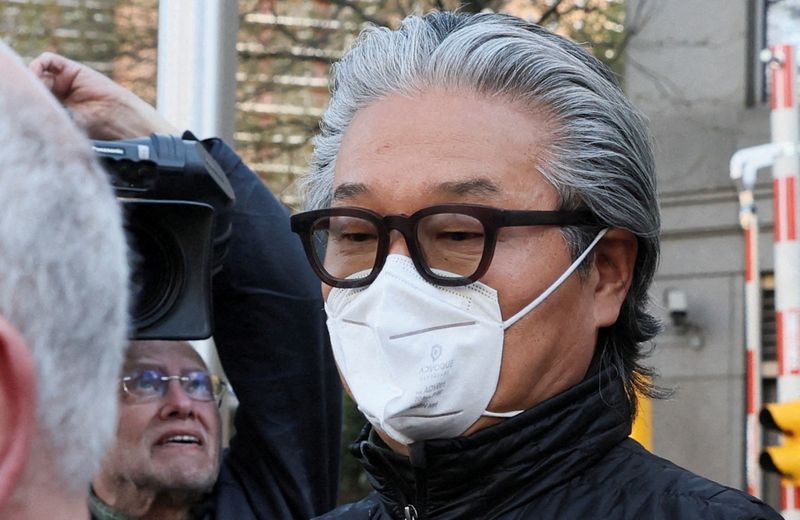What are they accused of?
Authorities accuse Hwang and Halligan of lying to banks in order to increase credit lines to Archegos and using the borrowed money to manipulate the stock price of companies in the portfolio of the family office weighing in $36 billion at the time. Among these positions, ViacomCBS, Discovery and Tencent Music Entertainment.
When Archegos collapsed in March 2021, its creditor banks lost around $10 billion.
What are the specific charges?
Hwang is charged with racketeering, securities fraud, counterparty securities fraud and wire fraud, as well as seven counts of market manipulation. Halligan is charged with racketeering, wire fraud and securities counterparty fraud.
What are racketeering and market manipulation?
The Department of Justice found that the duo was guilty of racketeering conspiracy to set up an illegal system for profit. The market manipulation charges against Hwang involve him making or directing trades in securities and security-based swaps in order to raise or lower their prices and induce others to buy those securities. .
Damian Williams, United States Attorney for the Southern District of New York, describes the cycle of how the Archegos scam works
What are the fraud charges?
Prosecutors alleged that the Archegos founder engaged in a securities fraud scheme to build positions in numerous stocks and manipulate their prices. Both Hwang and Halligan have been charged with counterparty stock fraud. Prosecutors say they lied to multiple banks about Archegos’ assets in order to obtain additional loans that helped fund ever-larger positions and keep stock prices inflated.
The two men were also charged with wire fraud against counterparties. Wire Fraud refers to fraud involving online and telecommunications networks. According to these charges, they allegedly made false and misleading statements through these means to defraud Archegos business counterparties.
Bill Hwang’s Story
Bill Hwang spent 25 years building his empire, which collapsed in four days. “In less than a week, at the end of March 2021, the house of cards collapsed“, said the Securities and Exchange Commission in a complaint against Hwang. This is the second time that Hwang has come into conflict with the justice system, which had already sanctioned him in the United States and Asia in 2012, for violations committed by his former hedge fund, Tiger Asia.

Bill Hwang, Founder and Director of Archegos, in Manhattan Federal Court
Operating from his Manhattan apartment as COVID-19 swept New York, Hwang began building huge positions in a small number of stocks using total return swaps, a strategy that allowed him to deploy big effects. leverage without having to declare their holdings. At the end of March 2021, Archegos had positions of more than 10 billion dollars in Baidu and Tencent Music and over $20 billion in ViacomCBS.
The fund used up to nine banks, giving the impression that different parties were behind the activity in the securities. This allowed Archegos to accumulate leverage of up to 1000%. And when banks questioned the fund about its positions with other brokers, Archegos tricked them into hiding its true exposure.
The son of a Korean pastor, Hwang moved to the United States as a child and earned several business degrees. He honed his stock-picking skills from 1996 to 2000 at Tiger Management, billionaire Julian Robertson’s pioneering hedge fund. In 2001, Hwang launched his own hedge fund business, Tiger Asia Management, with seed capital from Robertson. Tiger Asia has grown rapidly to more than $8 billion in assets after generating a 40% annualized return, according to a 2011 article in Institutional Investor.
But losses and regulatory issues in Hong Kong and the United States led the company to shut down in 2012. Hwang pleaded guilty to wire fraud related to illegal trading in Chinese stocks and paid $44 million to extinguish the insider trading charges in the United States. Then he turned Tiger Asia into a family office, renaming it Archegos Capital Management in early 2013. Wall Street banks were initially suspicious of Hwang due to his past run-ins with the law, but the Japanese bank Nomura Holdings finally gave him a second chance.
On March 22, 2021, Hwang’s house of cards began to wobble. ViacomCBS announced a capital increase and the price plunged. According to the indictment, Hwang mounted a massive counterattack to revive Viacom, attempting to counter the falling market. The $2 billion in trades consumed cash from Archegos, which would not have been able to meet its margin calls had the offensive failed. But Viacom continued to fall. Over the next two days, Hwang and his team scrambled to prevent margin calls from creditor banks. But they ran out of patience and started to unwind the trades, sending stocks plummeting. Several banks lost their feathers in the operation, in particular Swiss credit and Nomura Holdingsbut also Morgan Stanley, Mitsubishi UFJ, Deutsche Bank Where Goldman Sachs.
